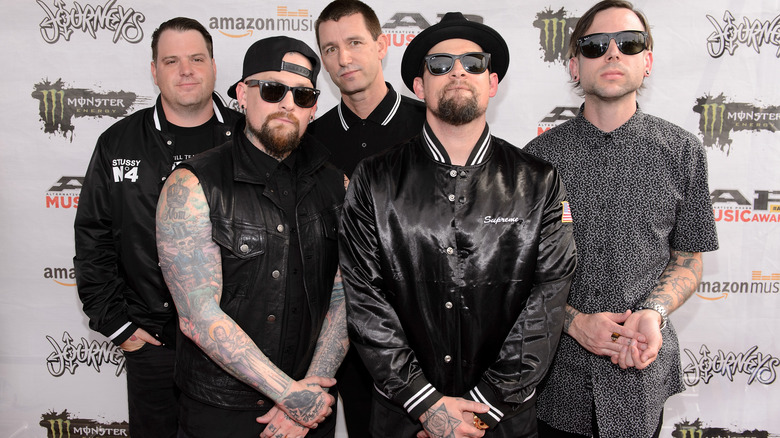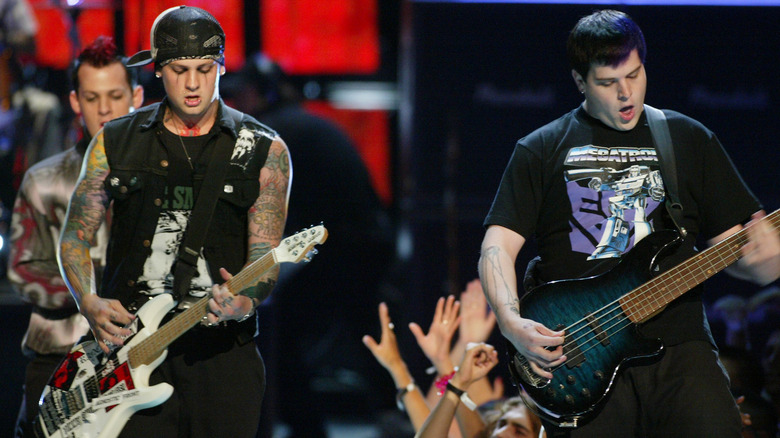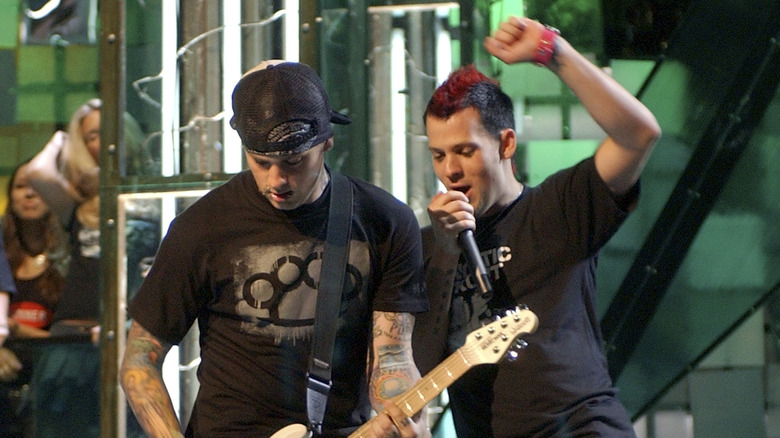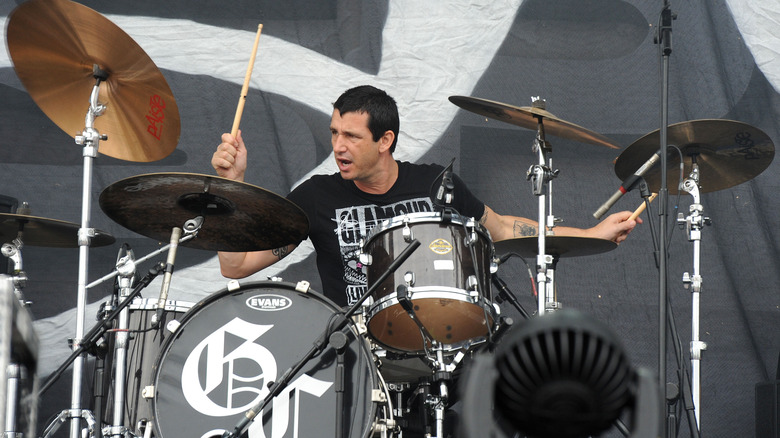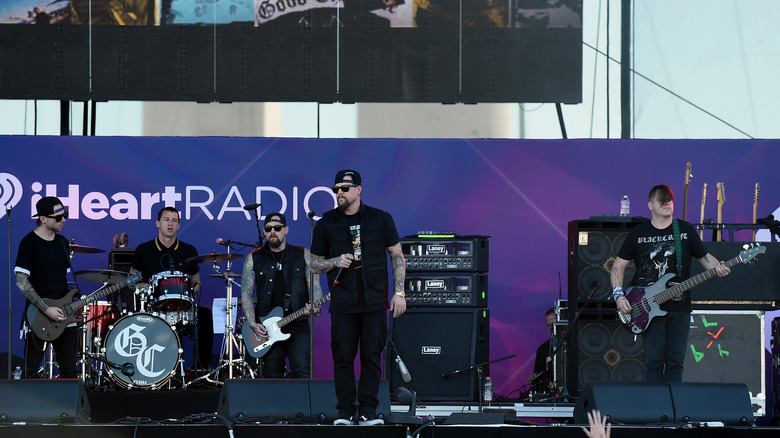The Untold Truth Of Good Charlotte
Good Charlotte has come a long way from their humble beginnings in 1996 when twin brothers Joel and Benji Madden decided to form a band after watching a Beastie Boys show, as noted by Rolling Stone. With Joel on lead vocals and Benji on guitars, the Waldorf, Maryland, band shot to fame in the early 2000s along with other young pop-punk acts such as Simple Plan and the All-American Rejects and became Vans Warped Tour regulars in the process. While they're no longer darlings of the so-called "scene kids" as they were back in the day, the band is still as active as ever after coming back from an extended hiatus in 2016. If anything, the fact that their most recent release, 2018's "Generation Rx," peaked at No. 18 on the Billboard 200 is a sign of their staying power at a time when most rock sub-genres are largely thought of as yesterday's news.
Fans of Good Charlotte are likely familiar with the origin of the band name (it came from a children's book), as well as the Madden brothers' oftentimes troubled childhood with an alcoholic father. Even non-fans know that Joel and Benji have been in their share of high-profile relationships, including, but definitely not limited to Benji's marriage to Cameron Diaz. But what about some lesser-known facts about the band that gave us "Lifestyles of the Rich & Famous," "The Anthem," and other pop-punk classics?
Their drive to become famous included a lot of reading
It goes without saying that trying to make it big as a musician isn't all fun and games. For the teenagers who made up Good Charlotte, opting not to attend college was part of that quest for fame, but instead of simply playing a ton of gigs and working menial jobs to make ends meet in the meantime, the boys did their fair share of reading. But instead of immersing themselves in the true stories of their favorite musicians, they were researching how to promote their band and how to get noticed by the record labels.
As Joel Madden explained to Rolling Stone, that was something they were doing as far back as high school. "Our whole goal was getting signed," he said. "So anything we could do, like reading books about getting signed, reading magazines — you know, 'The Musician's Guide to Touring and Promotion.' We'd come home from work and stay up till two or three or four playing guitar or making the things we sent to the record labels. You know, doing anything for the band. Then we'd have to get up at 6 or 6:30 to go to school."
The Madden brothers' music teacher, Timothy Bodamer, shared a similar story, telling the publication that even when they were still studying at La Plata High School in La Plata, Maryland, Benji and Joel were already "talking about agents."
The band's members had it rough with high school bullies
As Good Charlotte documented in "Little Things," the first single off their 2000 self-titled debut album, the band's members, particularly the Madden brothers, were regularly tormented by bullies during their high school days. Benji Madden was harassed for wearing black nail polish as part of his punk-rock look, while twin brother Joel was once the victim of an especially cruel prank at the hands of some La Plata jocks. If the song's lyrics are to be believed, not even making the baseball team was good enough for the cool, rich kids to stop their taunting and show the Maddens a little respect.
As it often goes with bands whose members were picked on in school, the best revenge for Good Charlotte was seeing their dreams of rock stardom come true. "Where are all those kids right now? They're either in jail or workin' on cars, livin' with their parents, doin' construction," original drummer Aaron Escolopio told The Washington Post. "Isn't it weird, like the majority of cool kids in our class are now working construction?"
While "Little Things" was not a huge rock hit, it did peak at a respectable No. 23 on Billboard's Alternative Airplay (then known as Modern Rock Tracks) charts on November 11, 2000 — not bad at all for a debut single!
They've been praised ... and criticized for their songs about suicide
Good Charlotte's sophomore album, 2002's "The Young and the Hopeless," was, on the surface, yet another fun pop-punk album in an era where the genre reigned supreme on rock radio. However, it also contained "Hold On," a song that the band wrote in response to the many fans who had told them in their letters that they were considering suicide (via MTV). Benji and Joel Madden called it the "most important song" on the album, with Benji saying that "we want to give [those] fans hope, just to let them know it's never worth taking your own life."
While "Hold On" rightfully got praise for handling the topic of suicide with gravitas, it was followed a few tracks later by "The Day That I Die," which also talked about suicide but in a manner that, to some, seemingly trivialized the topic through its jaunty melody and flippant lyrics. In his review of "The Young and the Hopeless," YouTuber Luke Spencer (aka Rocked Reviews) notably went out of character for over two minutes, angrily calling out Good Charlotte for being "hypocrite(s)" by including two thematically different songs about suicide. This, he opined, was an irresponsible attempt to pander to young and impressionable listeners. Near tears at multiple points of his rant, Spencer further accused the band of having "no regard for what they're singing about ... just so long as they make money."
If you or anyone you know is having suicidal thoughts, please call the National Suicide Prevention Lifeline at 1-800-273-TALK (8255).
Good Charlotte went through several drummers in their first decade
Although Joel and Benji Madden are the two individuals most people automatically think about when the name Good Charlotte is mentioned, guitarist Billy Martin and bassist Paul Thomas have been around almost since the very start. That's a pretty impressive feat — four-fifths of the band sticking around for more than 20 years without ever leaving at any point. It's not exactly as impressive as Green Day's Billie Joe Armstrong, Mike Dirnt, and Tre Cool staying together for over three decades and counting, but you've got to give credit where it's due. But what about the other one-fifth of Good Charlotte?
Much like many other bands, Good Charlotte had quite a hard time finding stability behind the drum kit. Per UK Festival Guides, their founding drummer, Aaron Escolopio, left in 2001 to join Wakefield, a band that also featured his brother Ryan. He was initially replaced by a temporary drummer named Dusty Brill (via MyCity Magazine), and when the time came to record "The Young and the Hopeless" in 2002, Brill was out and session veteran Josh Freese was in. Later in 2002, Chris Wilson arrived as the group's full-time drummer, though he left in 2005 due to health issues. Fortunately, his replacement, Dean Butterworth (pictured above), was available right away to fill in on tour (via MTV), and he's been with the band ever since.
The real reasons behind their hiatus and eventual return
By the early 2010s, pop-punk was no longer the genre of choice for most younger rock fans. The musical landscape was changing, and for Good Charlotte, it was time to take a break after a long period of recording albums and touring. At the time they announced their hiatus, it wasn't fully clear why they were pausing things indefinitely, but in 2016, Benji Madden spoke to TeamRock (via Louder) and offered more details on why they chose to go on break in 2011.
"We took a break from Good Charlotte because we really felt like it was our baby," he explained. "Over the span of four or five albums, it didn't feel like it was ours anymore; it belonged more to everyone else." He went on to suggest that the people who were benefiting from the band's success "didn't care about it as much as we did," adding that he and his brother Joel wanted to resume Good Charlotte only when it "felt right" to do so.
As for why the group felt 2016 was the best time to come back, Joel Madden told Entertainment Weekly that he and his bandmates "all felt like we had something to say" now that they were much older and wiser than they were during the peak of their success. "We took six years off [in between albums] and we got to live in our real lives and discover who we were outside Good Charlotte and who we were inside Good Charlotte," he continued.
